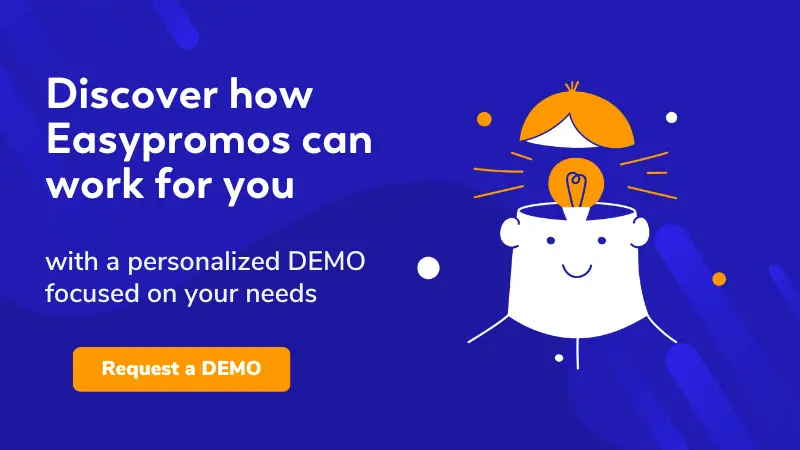Here’s everything you should know before you launch your next campaign with promo codes.
What are promo codes?
A promo code is a random set of numbers and letters associated with a discount or advantage, such as ‘free shipping,’ ‘free sample,’ or ‘buy one, get one free.’ Its benefit is applied during the purchasing process when the code holder presents it before making the payment. This code can take various forms: an alphanumeric string, a barcode, or a QR code. What’s important is being able to verify that this code is valid within a brand’s active reward program or promotional action. Typically, a different code is used for each person, making the benefit individual and non-transferable, thus limiting the promotion’s reach.
In the online world, promotional codes began to be used as a sales promotion tool in e-commerce. Many online store creation platforms, such as Magento or WooCommerce, have tools to generate promotional codes. However, besides generating them, which is relatively easy, the challenge is to come up with an efficient way to distribute them through the brand or company’s online and offline channels so that the promotion reaches a wider audience and leads to more visits and more sales. In the following paragraphs, we will delve into how this can be achieved using the Easypromos Promo Code app to create, manage, and distribute promo codes.
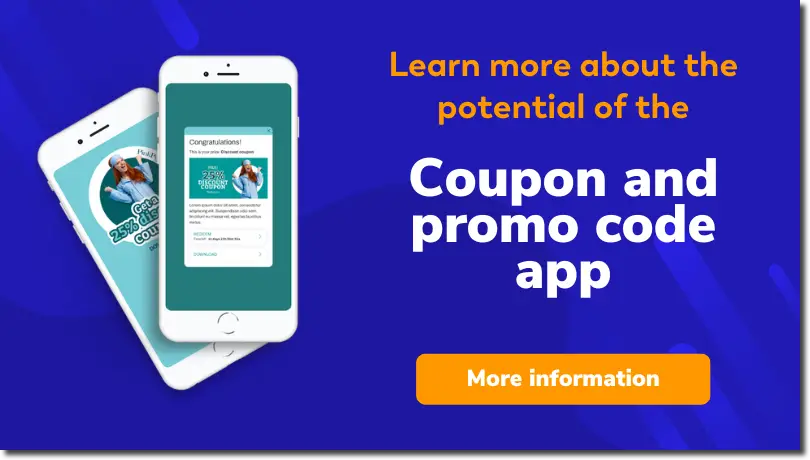
A promotional code is made up of random letters and numbers (also known as an alphanumeric code). Consumers can use them to redeem special discounts and deals, in-store or online. Because of their format, promo codes are very flexible: consumers can receive and use them on mobile, tablet, and desktop, via email, as PDFs, barcodes, and even QR codes.
Coupons and promo codes, what’s the difference?
We often talk about coupons and codes like they’re the same thing. But there are some subtle differences, and understanding them will help you plan your marketing campaigns with more precision.
A coupon is an image, either digital or printed, handed out to users with a message explaining the promotion. Most coupons consist of discount vouchers for a specific percentage of quantity. Additionally, they aren’t usually individually assigned and don’t necessarily have a promo code associated. Coupons are very visual, in the form of flyers, cut-out-and-keep coupons, PDFs, or images to share on social media. And they may or may not include a promotional code.
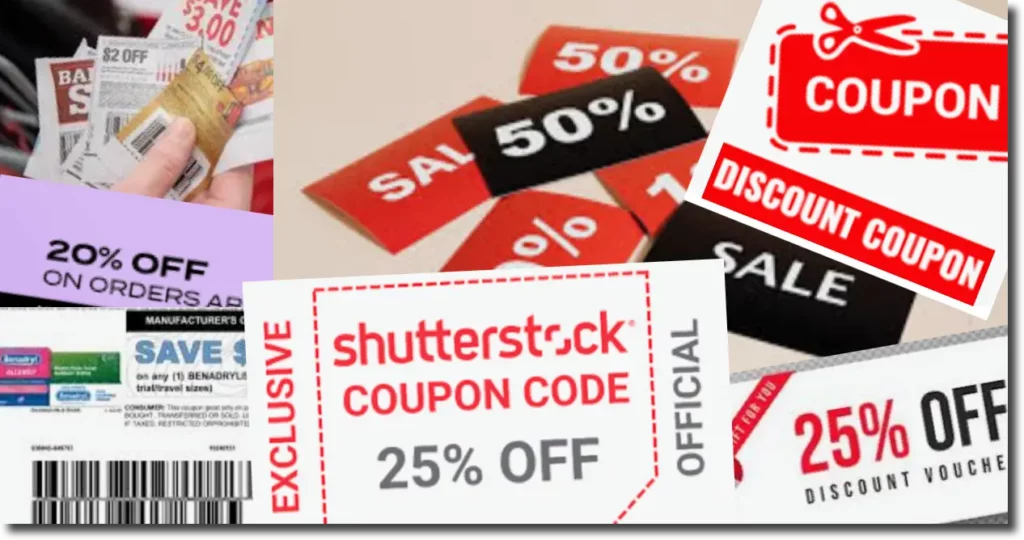
So, if coupons can effectively communicate a promotion, why use a promo code? There are several reasons to use promo codes alongside coupons, although it’s not always necessary. This will mainly depend on the nature of the campaign and the product. On the one hand, when a promotion distributes the same code to all customers, for example, “SUMMER20,” the main objective is to identify which promotion the customer originated from, to measure and analyze which promotional actions have a higher ROI. In this sense, using the same code for the entire campaign does not restrict its use to a specific number of beneficiaries; it only allows for their identification.
Another option is to distribute single-use codes to every participant. In this type of action, the aim is to precisely identify individuals and track their conversion: through which channel they were impacted, which code they obtained, and when they redeemed it. Promotional codes make a lot of sense when the promotion has a maximum number of beneficiaries. For example, because the profit margin is significantly reduced, and the organizer cannot afford to give away a large number of discounts. They are also useful in promotions aiming to analyze the conversion process or in businesses where it’s important to quickly identify and redeem the reward. Therefore, it is important to distribute coupons with alphanumeric codes, barcodes, or QR codes, and to be able to verify them easily.
Some of the main benefits of a well-run promo code distribution campaign are:
- Building customer loyalty.
- Attracting new customers.
- Promoting the brand in new segments.
- Gather user feedback by asking users to fill out a survey prior to obtaining the promo code.
- Lead generation and gathering contact information.
- Analyzing with promotions appeal the most to the audience and which are the most efficient channels.
Steps to create a coupon and promo codes distribution campaign
The most common steps to launching such a campaign are:
- Decide the amount of the discount to be offered.
- Determining the target audience that will benefit from this discount.
- Defining the dates in which the discount will be valid.
- Creating the promo codes.
- Distributing the promo codes
The Easypromos platform helps distribute promotional codes to users on Instagram, Facebook, Twitter (X), YouTube, and other online channels, offering exclusive discounts to those interested in the offer and who fill out the registration form. Furthermore, Easypromos makes distributing these codes easy and user-friendly, and allows for the configuration of the entire campaign for optimal distribution:
- Upload the codes to the app for distribution to users and decide on the format.
- Create and design your customized online coupons with the editor (optional).
- Upload and display instructions for redeeming the promotion and its usage details.
- Distribute the code at the end of the registration process and allow users to download it in PDF format or send it by email.
- Verify that it is a valid coupon using the prize redemption tool.
- Track each unique code: which channels have brought in more users, which channels have converted more customers, filter by redeemed codes, etc.
- Send emails to remind users that they can still redeem the coupon and the expiration date.
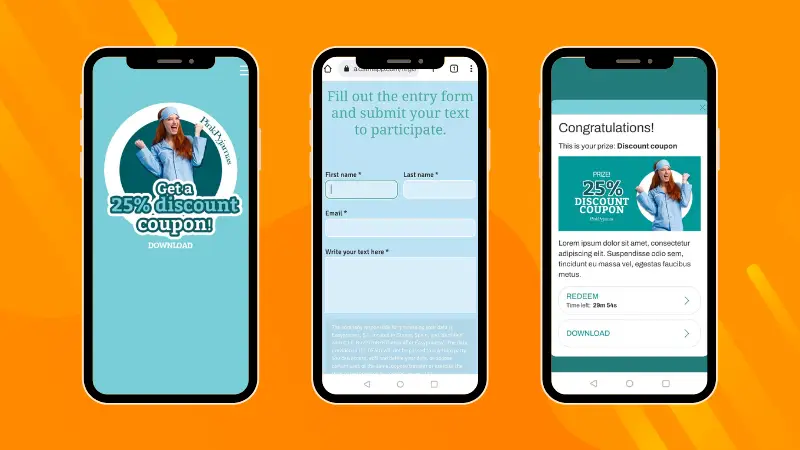
Benefits of distributing promo codes online and on social media
Distributing discount vouchers and other promotional coupons has benefits but also risks. If a promotion is launched without restrictions and segmentation, it can negatively impact the brand and product’s image and lead users to associate it with a lower cost.
Running indefinite promotions without limiting their scope can harm the brand and product’s value. On the other hand, if you offer promotional codes through an app, as part of a time-limited and target-specific campaign, it becomes an exclusive action, an advantage to be seized before it’s gone forever. This is because the promotional code is not given away without anything in return; the user provides their personal information and shows interest in the product.
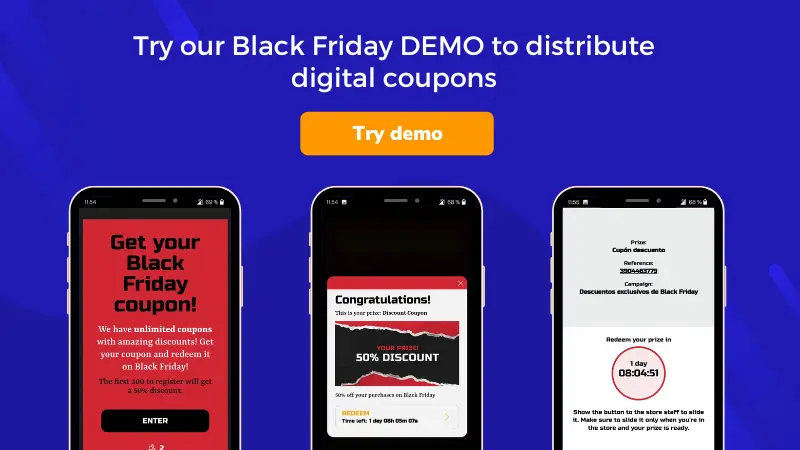
Filling out a required registration form to obtain the promotional code allows for an initial filter, which is complemented by others that can be generated: the channel through which the promotion is distributed, the segment to which it is disseminated through advertising, the fields requested in the registration form, etc.
Common examples of promo codes distribution campaigns
Here are 3 of the most common examples of promo codes campaigns and how to share them on social media and online channels.
A single promo code to be distributed among online users
In this case, the organizer has a code, for example, the code “FB-FREE-SHIPPING,” which, when applied in their online store, allows the user to enjoy a purchase with shipping costs included. All users who sign up for the promotion will be able to see the coupon image at the end of the registration process.
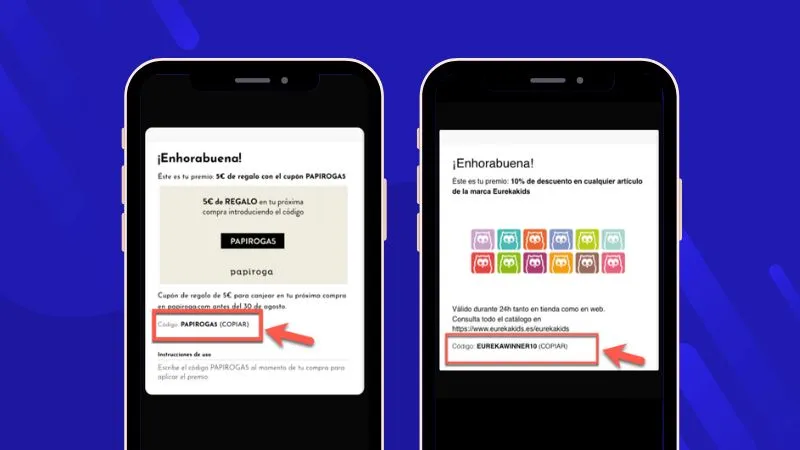
A single promo code to be distributed to 100 users
In this case, the promotion organizer has a discount code that can be applied on their website, just like in the previous case. However, the difference is that they only want 100 users to benefit from the discount. In this scenario, a coupon app can be created but limit the maximum number of users to 100 and define what to do when all discount codes have been distributed: either close access to the promotion or allow users to register but inform them that the discount codes have run out. This approach can be useful if you want to have people on standby, on a waiting list, or if you want to offer a second prize, such as a final prize draw among all those who signed up for the promotion.
100 different promo codes to be distributed to 100 users
In this case, the administrator has 100 different promotional codes and wants to distribute the coupon to only 100 users. This could be the scenario for a business that wants to give away 100 codes for purchases and discounts for the iTunes store. In this case, iTunes works with unique promotional codes per customer.
To set up a promotion of this type with Easypromos, you only need to load the 100 codes into the Coupons app before the promotion starts. This way, the codes will be handed out to users that register. Similarly, you can also assign these 100 codes in other ways, for example:
- Assign them by drawing among all those who register for the promotion.
- Assign them by “Instant Win” based on whether the user registers at a preset winning time.
Distributing promo codes randomly
For instance, there are three types of discount codes, corresponding to 20%, 30%, and 50%, and they need to be randomly assigned to all users who sign up for the promotion. This is a very specific case of distributing promotional codes that can also be configured using Easypromos.
The platform allows to preconfigure the discount coupons as prizes, indicating how many to distribute and under which criteria. For example, users interested in children’s sneakers will receive a 20% discount, users interested in women’s footwear a 30% discount, and users looking for men’s footwear a 50% discount. This way, different discounts can be ofered based on the product users are interested in, taking into account stock and sales objectives. The best way to distribute coupons with various discounts is to use the digital coupon booklet, which provides greater visibility of all the coupons.
A single promo code to be raffled among all registered participants
In this case, the promotion prize is the discount code itself. The best approach is to create a final prize draw where participants provide their email in the registration form. Once the winner is selected through a random draw, the promotion organizer will send the discount code to the winner’s email.
Do you have questions about sharing discounts and promotional codes? Make sure to contact us via our live chat!
